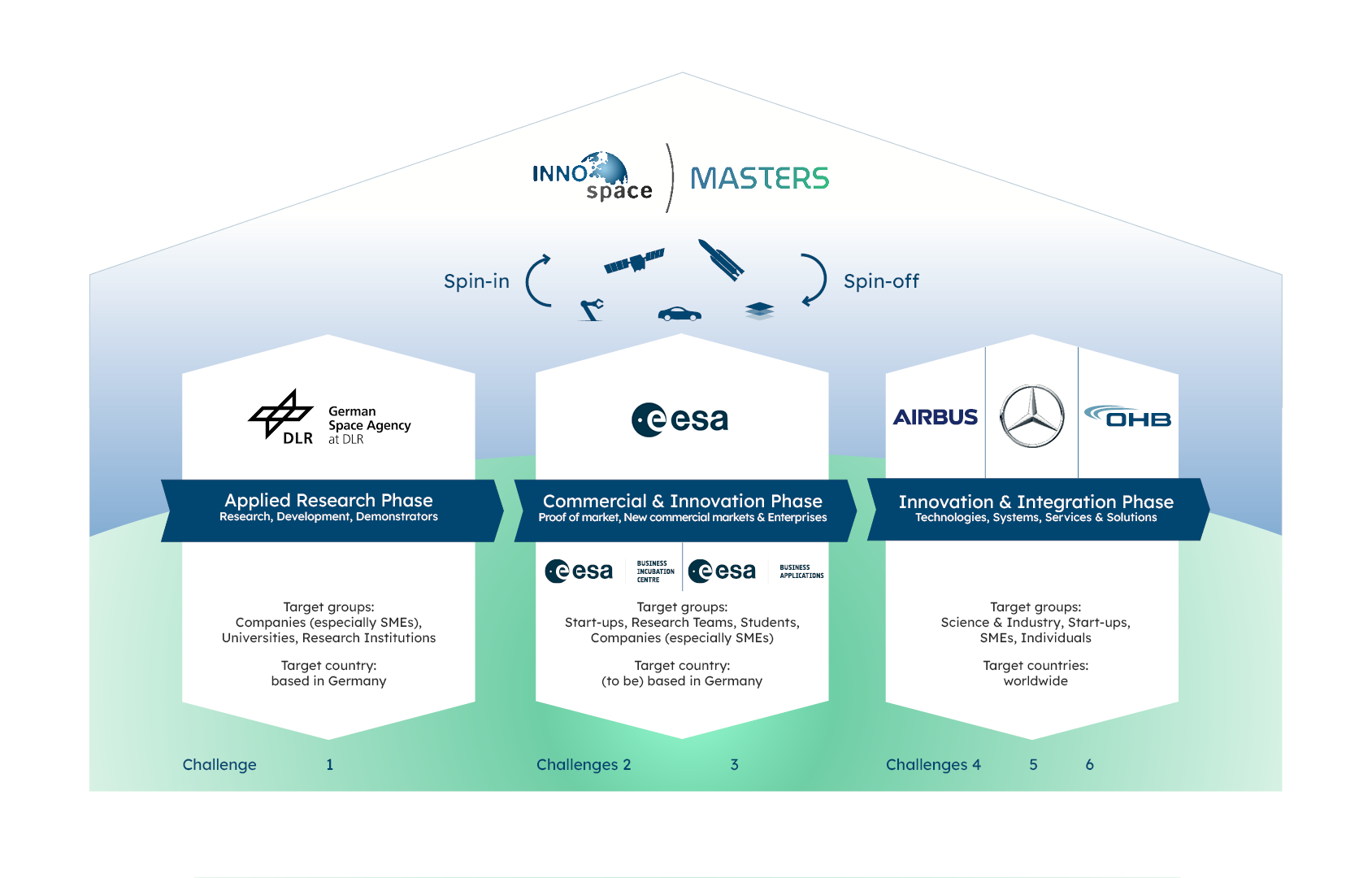Our six challenges 2024
INNOspace Masters promotes ideas for the transfer of technology and expertise from other industries to the space sector (spin-ins/New Space) or from space to non-space sectors (spin-offs).
The overall theme for the 2024 round of the competition is:
Space up your Life – Innovations for a smarter Earth and Space
Under this overall theme, the competition offers six different challenges for you to participate in. Each challenge covers a wide range of topics and focuses on a different stage of technological maturity – from applied research to market-ready solutions.
In addition to global networking contacts, the winners will receive technological and commercial support, as well as assistance with project implementation.
All challenges at a glance

Each challenge in detail
DLR Challenge 2024:
"Applied Research for Disruptive Innovation"
On behalf of the Federal Government, the German Space Agency at DLR designs and implements the German Space Programme, which integrates all German space activities at national and European level.
The German Space Agency at DLR has started the INNOspace® initiative to promote innovation, technology transfer and new markets.

The challenge:
The space industry is in transition: New technologies make concepts like commercial spaceflight or in-orbit manufacturing economically feasible, disrupting the market and opening up space for all earthly innovation sectors – and vice versa. Therefore, the German Space Agency at DLR is looking for smart ideas and concepts for space spin-ins and spin-offs that lead to improved technologies, processes, and applications by transferring expertise between Earth and space. The focus of the DLR Challenge is aimed at technology developments prior to commercialisation. Cross-industry cooperation projects are of particular relevance. So team up with partners from other industries and submit your idea!
This year’s DLR Challenge impulse topics include, but are not limited to:
- Digital technologies for and from space, e.g. artificial intelligence, swarm intelligence and visual computing; quantum innovation for space; intelligent & connected sensor systems; and more
- On-orbit economy, e.g. development of novel materials or pharmaceutical agents in microgravity; autonomous orbital manufacturing processes; and more
- Sustainability in space and for Earth, e.g. space debris protection and mitigation; advance monitoring of environmental and social sustainability on Earth; and more
- Biotechnologies for space and Earth, e.g. bioprocessing methods for in-space nutrient extraction from crops or (food) waste; tissue engineering in microgravity; and more
Ideas can range from basic applied research up to technology demonstrators.
Rewards and journey
- The 3 winning projects will be invited to submit an individual or joint proposal to receive funding from Germany’s national space and innovation programme. Verified proposals will receive
- Up to EUR 500,000 in possible funding for each project over a period of up to 2 years (excluding own contribution)
- This funding is subject to the general funding guidelines of the German Federal Government (link to Commission Regulation (EU) No 651/2014). The submission of a proposal does not constitute any legal entitlement to a grant
Who can apply?
- Space and non-space sectors
- Companies (especially SMEs)
- Universities
- Research Institutions
- Registered office or branch in Germany
ESA BIC Challenge 2024:
"Join the New Space Economy"
The European Space Agency (ESA) is dedicated to the peaceful exploration and use of space for the benefit of mankind. Established in 1975, ESA works with its 22 Member States to push the frontiers of science and technology and to promote economic growth in Europe.
One of our top priorities is to help companies seize the commercial opportunities to exploit space technologies and data and benefit society at the same time, with the ambition of creating a greener, safer and digital Europe. Our vision is to make the continent a space commercialisation hub, where innovative ideas can grow into world-beating space companies that benefit people all over the world.

The challenge:
There are tremendous commercial opportunities by using satellites and the technologies that underpin space infrastructure and data. Space assets and insights derived from space data generate value in non-space domains such as critical infrastructure, communications, (cyber) security, green transition, sustainable mobility, and more. Today, more innovative applications are becoming financially feasible. Thus, new commercial opportunities for all sectors arise, while creating benefits to new communities.
The ESA Business Incubation Centres (ESA BICs) and the ESA Business Applications and Space Solutions (ESA BA) programmes provide a comprehensive and structured system that supports innovative businesses who want to seize these opportunities.
The ESA BICs in Germany are searching for ambitious entrepreneurs with innovative business ideas involving space technologies or new commercial concepts for the application of space data. Start-ups will receive support to turn their ideas into a viable company. Potential innovation areas are:
- Mobility applications and solutions
- Innovative optimisation solutions
- Increased efficiency and customer orientation solutions
- Components or subsystems
- Any other ideas for the space sector or the utilisation of space data
Prerequisite: Valid space connection, existing business idea.
Rewards and journey
- To realise your vision, the 3 winning proposals will receive a support package tailored to the requirements to transfer the ideas from a concept to reality, including:
- Support with the application to one of the German ESA BIC facilities. If accepted, the start-up will benefit from EUR 50,000 in funding
- Assistance in transforming the business concept into a viable business plan
- 1:1 Coaching Sessions with ESA experts and exclusive tour of the European Astronaut Center EAC in Cologne
- Access to the Europe-wide network of experts, which can assist in both, technological and business-related aspects
Who can apply?
- Space and non-space sectors
- Start-ups
- Research Teams
- Students
- Individuals
- Registered in Germany or planning to get registered in Germany
ESA BA Challenge 2024:
"Space for every Industry"
The European Space Agency (ESA) is dedicated to the peaceful exploration and use of space for the benefit of mankind. Established in 1975, ESA works with its 22 Member States to push the frontiers of science and technology and to promote economic growth in Europe.
One of our top priorities is to help companies seize the commercial opportunities to exploit space technologies and data and benefit society at the same time, with the ambition of creating a greener, safer and digital Europe. Our vision is to make the continent a space commercialisation hub, where innovative ideas can grow into world-beating space companies that benefit people all over the world.

The challenge:
There are tremendous commercial opportunities by using satellites and the technologies that underpin space infrastructure and data. Space assets and insights derived from space data generate value in non-space domains such as critical infrastructure, communications, (cyber) security, green transition, sustainable mobility, and more. Today, more innovative applications are becoming financially feasible. Thus, new commercial opportunities for all sectors arise, while creating benefits to new communities.
The ESA Business Incubation Centres (ESA BICs) and the ESA Business Applications and Space Solutions (ESA BA) programmes provide a comprehensive and structured system that supports innovative businesses wanting to seize these opportunities.
In a drive for a sustainable future, ESA BA supports businesses of all sizes and across all sectors to develop innovative solutions for Earth using space technology. We are looking for innovative technologies or applications for sectors such as:
- Smart City & Smart Region
- Health (remote health services, telemedicine)
- Green Energy Transition
- Sustainable Mobility and Logistics
- Circular Economy
- And more
Prerequisite: High technological readiness level, utilisation of space technology or data, concept for innovative application in terrestrial market and confirmed customer need.
Rewards and journey
- To support you to seize the commercial opportunities within your idea, the 3 winning projects will be invited to submit an individual or joint proposal to receive funding from the ESA BA programme of up to 75% of their respective project scope, i.e.
- Up to EUR 225.000 zero-equity funding each (for a project scope of max. EUR 300.000)
- Personalised support from a member of the ESA team
- Technical & commercial guidance
Who can apply?
- Space and non-space sectors
- Start-ups
- Companies (especially SMEs)
- Research Teams
- Registered in Germany
Airbus Challenge 2024:
"Boosting responsible Commercialisation of Space"
Airbus is a European leader and pioneer in the space sector, with a strong focus on technology and industrial development using new commercial approaches. With the vision of a zero-waste space industry, Airbus aims to boost space commercialisation in Europe, whilst focusing on efficiency and sustainability, both on Earth and in space. The aim is to create a green space market and to promote new space applications by integrating and connecting different systems and sectors along the entire space industry value chain.

The challenge:
Airbus is looking for innovators with ideas for exceptional hardware, industrial processes, applications, or business models with relevance for space that promise to have a lasting influence on our daily lives. The focus is on smart solutions enabling sustainable and efficient innovations for space and Earth on topics such as, but not limited to:
- Zero Debris & zero waste in satellite and launcher production: e.g. technologies for resource efficient and low environmental impact manufacturing on Earth; concepts and technologies for resource recovery and removal of space debris for Earth or ideas for commercial platforms and payload approaches
- Enable 5G / 6G Connectivity from space to Earth: Concepts and technologies to connect and integrate space-based networks and data into terrestrial mobile networks; new IoT and AI applications and services enabled by hyperconnectivity e.g. in environmental monitoring, secure communications, logistics, telemedicine or smart cities.
- Space Flight in Low Earth Orbit (LEO): Technologies and applications for building and sustaining infrastructures in LEO, development of use cases for non-commercial and commercial manned space flight.
Rewards and journey
- The top three are invited to contribute their ideas on smart solutions enabling sustainable and efficient innovations for space and Earth. To achieve this, Airbus will accompany your journey with
- Support from Airbus internal network of experts
- Access to space qualified tools, simulation and test equipment
- Development of a mission proposal (with the aim of a joint application for public funding)
- Opportunity to pitch to Airbus Ventures
Who can apply?
- Space and non-space sectors
- Science & Industry
- Start-ups
- SMEs
- Individuals
- From Germany, Europe and worldwide

The challenge:
Mercedes-Benz is looking for smart innovation for future mobility enabled by space solutions. Join the Mercedes-Benz car2space Challenge at INNOspace Masters:
- Explore Earth observation data for autonomous and electric vehicles, leverage weather and climate monitoring or invent solutions for supply chain monitoring.
- To meet tomorrow’s connectivity needs, design hybrid telecommunication solutions (terrestrial x orbital), ad-hoc networks and enabling technologies.
- In the field of navigation & mapping, create new technology applications and mobility services.
- Innovate with cutting edge technologies such as Digital Tech (AI/ML, digital twins, simulations), Situational Awareness (sensors like camera, radar, lidar, etc.) & Infotainment (app-based interactions, AR/VR/MR).
- Develop Hardware-based innovations and Novel Materials or discover solutions to improve Efficiency (system complexity, energy savings, emission reduction).
Rewards and journey
- Leveraging the Zeitgeist of fascination for the space age, make a difference in our everyday's lifes and co-create the future of exciting and accessible consumer experieces.
- Opportunity to learn about how to meet consumer needs ("downstream")
- Implement a Proof of Concept co-funded by Mercedes-Benz and supported by inhouse experts
- Opportunity to pitch Proof of Concept to company executives and receive coaching, mentoring and support for creating an automotive product and/or service
- Opportunity to learn about potentials of technology transfer and an industrial scale-up opportunity
- Access to and support from experts at Mercedes-Benz Research and Development departments
Who can apply?
- Space and non-space sectors
- Science: (Technical) University (of Applied Sciences)
- Industry
- SMEs
- Start-ups
- From Germany, Europe and worldwide
OHB Challenge 2024:
"Shape Space for a better Future"
With more than 40 years of experience as an independent force in the European space industry, OHB tackles one of the biggest challenges of today: The sustainable and cost-efficient use of resources. Thus, especially synergies and developments for space and Earth should be in focus. The technologies developed by OHB cover the entire cycle of space innovation from building and launching satellites into space via establishing ground stations and IT solutions. We are always open to new creative approaches, including the exploration of new worlds in space and on the ground.

The challenge:
Our world does not stop at the exosphere. Space systems and technologies and their sustainable applications are vital for securing our future. OHB is looking for smart ideas at all stages of innovation – from novel concepts to cost-efficient and competitive solutions. Ideas could focus on, but are not limited to, the following areas:
- Green space: e.g. improvement of satellites in the manufacturing process as well as new designs to eliminate space debris
- Using space resources: e.g. concepts and technologies for sustainable use of manufacturing processes under µg (in-orbit manufacturing) or In-Situ Resource Utilization (ISRU) to efficiently optimise space exploration programmes
- Software and IT solutions: e.g. smart sensors for data collection and smart concepts for combining data from Earth and space
- Health: e.g. transfer of technology solutions to ensure the health of astronauts or medical findings from space missions and life in microgravity.
Rewards and journey
- Being selected by OHB, the 3 winners gain the opportunities to jointly shape space for a better future with the support of OHB, including
- OHB Venture Capital support opportunities
- Depending on the ranking specific hours of expert support
- Support from relevant experts from the OHB Group
- Opportunity of a joint technology development programme
- Cooperation opportunities at European level through companies in the OHB Group
- Invitation to meet the OHB Group and the space community at a fair
Who can apply?
- Space and non-space sectors
- Science & Industry
- Start-ups
- SMEs
- Individuals
- From Germany, Europe and worldwide
Evaluation Criteria
Learn which criteria the submission needs to fulfill in order to have the best chances of winning the dedicated challenge.